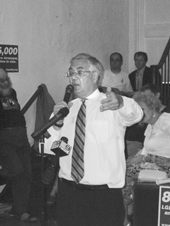After an historic ruling from the Supreme Judicial Court of Massachusetts in November 2003, same-sex marriage became a reality in that state the following May, more than a year ago.
Yet, opponents of gay marriage continue to press for a way to roll back that gain—either through an amendment to convert the marriages into civil unions, in a ballot measure that could be voted on in November 2006, or through the outright elimination of same-sex marriage, with no alternative put in place, in a referendum that can happen no earlier than November 2008.
Democratic U.S. Rep. Barney Frank, the longest-serving openly gay member of Congress, is optimistic that gay marriage in his home state can be preserved.
At last Saturday’s pro-marriage gathering in Maplewood, New Jersey, Frank told Gay City News that the efforts by some conservatives to convert gay marriages into civil unions via a 2006 amendment referendum is likely to fail, both because the anti-marriage caucus in the Massachusetts’ Legislature lost seats since last November’s election and because the gay community’s staunchest opponents would rather eliminate gay marriage outright rather than replace it with civil unions.
Frank noted that two Democrats opposed to gay marriage were defeated in their re-election bids and another three retired. In order for the civil union amendment to get on the 2006 ballot, a majority vote of the state Legislature, sitting in joint session, is required before then. The first of the two required legislative votes, last year, just squeaked by.
But Frank made clear that right-wing opponents of gay marriage are really looking to 2008, in any event. The effort for a 2006 amendment, he said, “is probably going to lose. The right wing has decided to not fight for the amendment because it mandates civil unions and they hate that.”
Frank noted that the harshly anti-gay Massachusetts Republican governor, Mitt Romney, has repudiated the 2006 amendment.
“If it comes up [in the Legislature], it will be voted down,” Frank predicted.
Many conservatives are now focused instead on gathering petition signatures for an amendment that would only require 50 votes out of the 200-member state Legislature, in two successive sessions, to make it on to the 2008 ballot. The wording of that amendment would simply bar same-sex marriage, without providing gay and lesbian couples with any compensating benefits.
Frank also voiced optimism that this initiative would fail.
“It wouldn’t get on the ballot until 2008, and by then, marriage will have been around for four years, and public opinion will have shifted some, and fears about gay marriage will have dissipated,” Frank said.
When asked about the February decision by New York Mayor Michael Bloomberg to appeal a State Supreme Court ruling ordering the city clerk to issue same-sex marriage licenses, Frank said, “It was outrageous. It’s an example of how Republicans who say they mean well are still under great pressure to go against us.”
Frank argued that the example of same-sex marriages taking place in New York City would have had a powerful impact on other courts considering marriage challenges elsewhere in the state.
“One of the things that helps us win is to have [marriage] in the first place,” he said. “When same-sex marriage is in place, it shows.”
While acknowledging that the city ruling would inevitably been affected by higher court rulings in New York, he said Bloomberg’s appeal “deprives us of the chance to show how same-sex marriage has no negative impact on society. Had Bloomberg not appealed, New Yorkers would have been allowed to marry. The appeal would have come, but after there had been some marriages.”
“Nothing defeats prejudice more decisively than the reality,” he said.
Asked to speculate on how New York might arrive at the place where Massachusetts is already, Frank responded, “Exactly how you get there, I don’t know.”
—Seth J. Bookey
gaycitynews.com



































